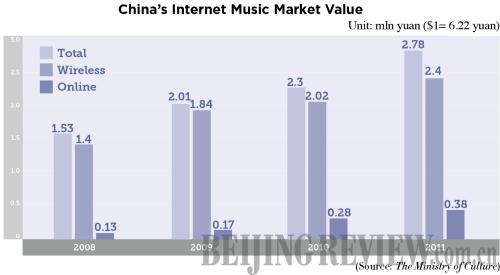|
Xie added that the government needs to further tighten regulation over manufacturing and distribution by imposing heavier penalties. "This will cost jobs, but it is a hard lesson people may have to learn about respecting others' intellectual products," he said.
It is not the first attempt to compel Chinese people to pay for the products of the music industry. As of November 2006, in order to protect the interests of lyricists and composers, the then State Copyright Bureau issued a regulation asking karaoke venues all over the country to pay royalties for listed music.
But the regulation has not been implemented well as it didn't set up a clear royalty standard taking into account varying occupancy rates of karaoke clubs.
"Generally, each room in the karaoke club should cost 12 yuan ($1.93) per day, but why should we pay the money when most of the rooms are empty?" said Rao Gang, a karaoke manager in Guangzhou, southern Guangdong Province, who joined a campaign with other karaoke owners to reject the regulation.
Lyric writers and composers, whose rights the regulation was set to protect, were less than pleased. "The karaoke charge will be collected by the CAVCA and distributed between the CAVCA and the Music Copyright Society of China," said composer Li Guangping. "We only get a tiny percentage of it, and I know some composers haven't even got a penny from it two years after the release of the regulation."
On March 31, the National Copyright Administration posted an announcement on its official website asking for public opinions on a draft amendment to the Copyright Law.
China's Copyright Law, which came into effect in 1990, was amended in 2001 and 2010.
Articles 46 and 48 are of great concern to the music industry. According to Article 46, a recorded work can be used by other music producers three months after the work has been publicly released without the permission of the creators. Article 48 stipulates that entities using musical works for financial gains should pay royalties to a copyright agency one month after they initiate use, and the organization will transfer revenue to copyright owners in time.
"It is ridiculous," said well-known songwriter Gao Xiaosong. "Three months is not enough time for a song to get popular, and when it gets popular after three months, everybody can use it free of charge. It is totally against the rights of songwriters."
"It is like I finally gave birth to a baby after a 10-month pregnancy, and three months later, it is not even mine anymore," said Liu Siqi, General Manager of the Starwin Cultural Communication Co. Ltd.
"Article 48 simply transfers the songwriters' rights to a copyright management organization, which is hard to understand," said songwriter Xiao Ke. "That means everybody can use works without the permission of the songwriters as long as they pay after, and they don't even pay directly to songwriters. They pay a third party. I don't think the copyrights of musical works can be protected in this way."
Besides that, Article 69 of the law stipulates that Internet companies who provide search, storage or linkage service are not obligated to verify whether the material they provide is copyrighted. Members of the recording industry fear this opens the door to piracy.
"In the past, Internet companies felt a bit worried when they provided illegal online music downloads, but if relevant regulations in the draft amendment are officially implemented, these companies don't even need to find any excuses," Liu said. "The biggest problem is that China's emerging digital music industry might be hurt terribly."
Liu said that digital music is the future and hope of the music industry, and its potential can only be based on a sound copyright protection environment.
Li Ji, a journalist from South Metropolitan News published in Guangzhou, also has different ideas of the "authorization" item in the amendment. "As for the collective copyright administration mentioned in the draft amendment, some explain that because there are no effective communication channels for owners of copyrighted material and users, it is unrealistic to act following the principle of authorized use," Li said. "This explanation is unacceptable. Whether a work is widely used or not is the creator's personal business. It is a matter related to every individual copyright owner. Collective management neglects the rights and interests of copyright owners."
Email us at: yuanyuan@bjreview.com

| 